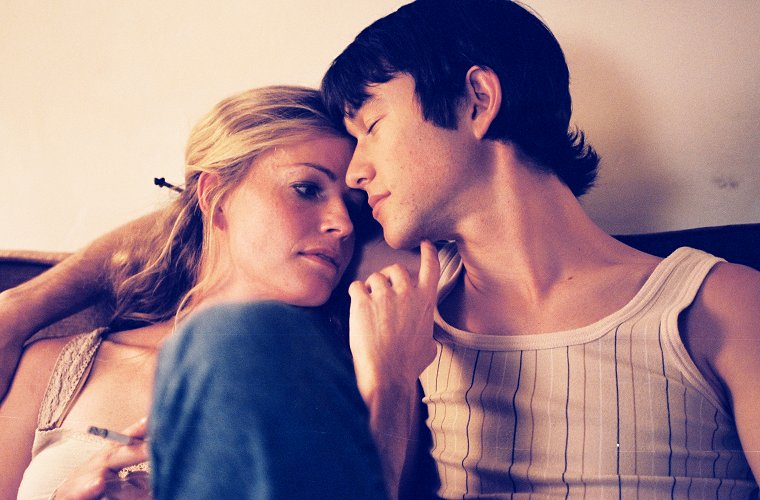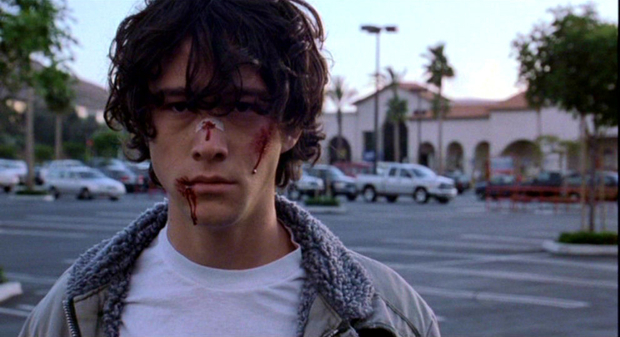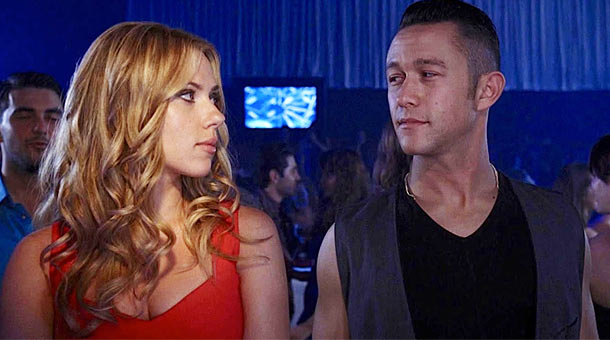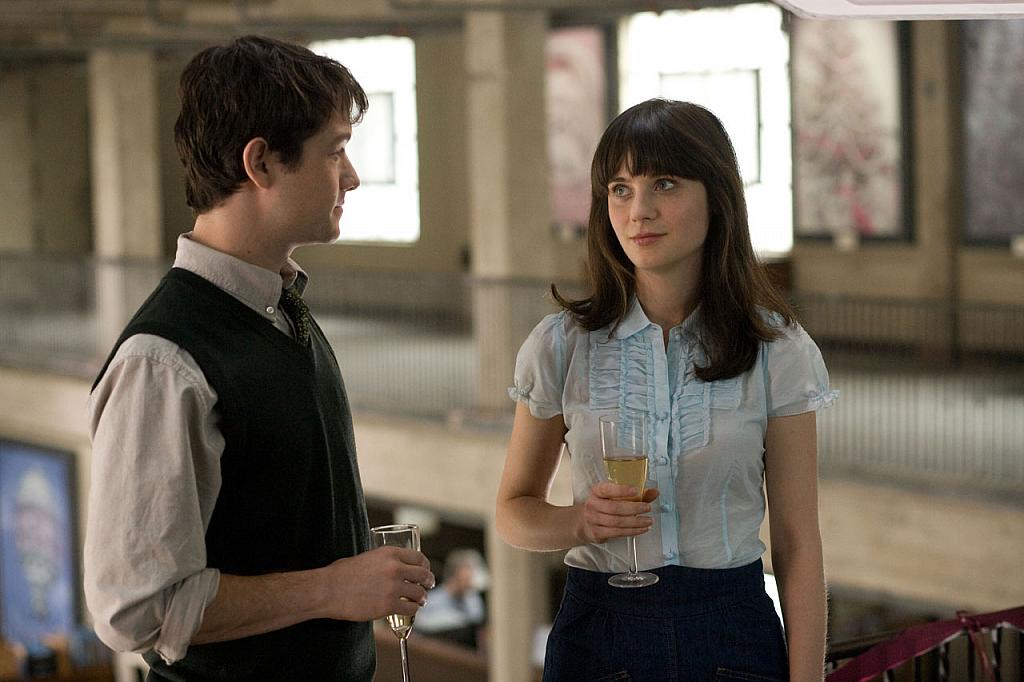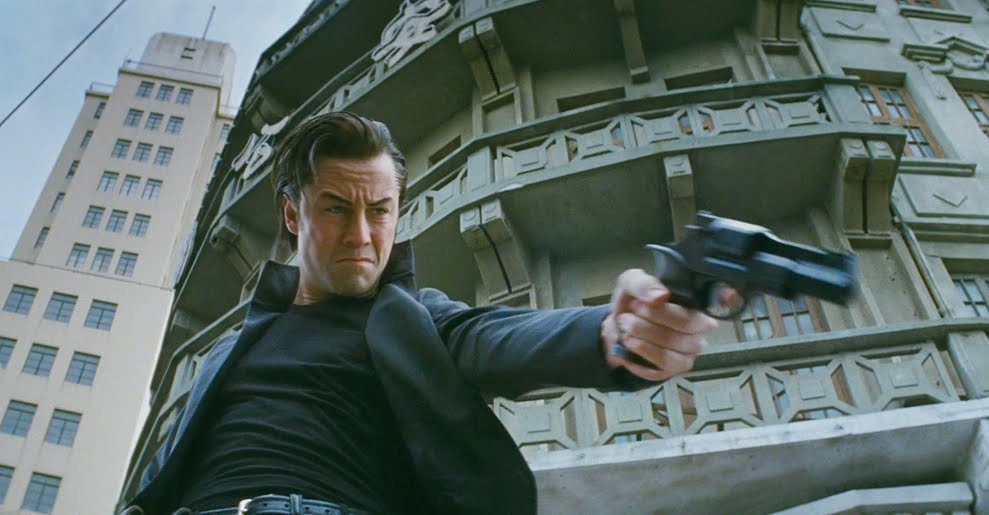5. Mysterious Skin (2004)
Gregg Araki is somewhat of a provocateur, creating films to challenge people’s perceptions on sexuality, drug use and mindless violence. Even his relatively mainstream stoner comedy Smiley Face is more than the mindless bong-humoured, poorly plotted misadventure one expects.
The Joseph Gordon-Levitt starring Mysterious Skin is Araki’s most highly regarded film with good reason; while referencing hot button topic paedophilia, Araki also explores the flowering of male homosexuality and the practice (and dangers) of prostitution to deeply dramatic and shocking effect.
There are two distinct yet intertwined narratives threads in Mysterious Skin. Brian (Brady Corbet) tries to get to the bottom of his 8 year old mystery blackout that ended in a bloody nose, believing that it has something to do with aliens while Gordon-Levitt’s Neil prostitutes himself around their small town before moving to New York where he has a Midnight Cowboy-style shock to the system.
This is the film, continued with Brick, where Gordon-Levitt showed himself as a progressive and remarkably brave actor a million miles from the safe fresh-faced shenanigans of 3rd Rock From the Sun. Viewers be warned, Mysterious Skin is extremely sexually explicit.
4. Brick (2005)
Brick is the kind of film that, despite being in English, requires subtitles, if only to catch and appreciate the full richness of the updated-genre dialogue. That initial chat between The Brain and Brendan: a linguist’s dream.
Anyone who has seen a Rian Johnson film knows that one of his greatest strengths is reworking genre conventions and tropes into something new and refreshing; Brick takes film noir plotting and its stock character types (detective, femme fatale, muscle, kingpin) and sets it in a high-school. Genius. Where else would the Raymond Chandler-type high emotional drama, cliquey chatterings and slang-jargon make sense in a modern context but within the lives of teenagers?
Joseph Gordon-Levitt plays the detective role as Brendan. After his former-girlfriend disappears Gordon-Levitt’s put-upon hero attempts to find out who is to blame, soon uncovering a labyrinthine cover-up featuring jilted lovers, secret pregnancies and a whole lot of drugs.
The teenage cast make for some amusing set-ups – instead of a police chief captain Brendan answers to Assistant Vice Principal Trueman, and a bar-type conversation situation between Brendan and his main suspect is bar-tended by the suspect’s mother, complete with milk and cookies.
Gordon-Levitt’s Brendan is a witty opportunist improviser (witness: him equalising a pursuer in his socks) and an all-around plucky fighter: though in his fight with Brad Bramish he has a definite height and weight disadvantage and gets knocked down a fair bit, Brendan keeps coming at him. He is tenacious, someone willing to track down dead leads with his own motives for the why.
Generally seen as Gordon-Levitt’s breakout role, as an indie film it gave him incredible credibility but it was high-profile enough for taste-makers to see him and cast him in bigger films i.e. 500 Days of Summer and Inception.
3. Don Jon (2013)
Don Jon actively attacks romantic comedy conventions, and so creates a genre satire and is a thorough look at what makes men and women tick. Jon (director Joseph Gordon-Levitt) is a testosterone-filled fuck machine, delighting in his many sexual conquests until he meets his perfect woman (Scarlet Johansson), in his words “a dime” (a ten out of ten).
Soon Jon’s pornography addiction gets in the way of his burgeoning relationship. Don Jon draws some interesting parallels between men’s interest in pornography and women’s interest in romantic comedies – their guilty pleasure status, their inherent fakeness, the fact that both mediums require the one of the parties to give themselves to the other completely within the narrative to reach their respective happy endings.
Director Gordon-Levitt mines this aspect for comedy potential: the real sex versus porn comparison is hilarious, and the film gets extra satire points for the perfectly self-reflexive send-up of rom-coms starring real-life genre regulars Anne Hathaway and Channing Tatum.
Gordon-Levitt playing the antithesis of his introspective 500 Days of Summer persona is also plenty laughable. Brie Larson should win an award for her winning supporting performance as Jon’s sister, perfectly illustrating humanity’s sensory disconnect from modern life. All in all Don Jon has a sharp eye, a dirty mind and, eventually, a pumping heart.
Don Jon has all the hallmarks of 90s auteur cinema: written, directed, starring, post-modernist touches, self-reflexivity and main character voice-over. Is Gordon-Levitt attempting to be Tarantino, the Coens or Aronofsky?
The themes of obsession and/or addiction from Aronofsky’s work are a definite presence, while Gordon-Levitt’s cutting around the explicitness of the pornography is more than slightly reminiscent of Reservoir Dogs’ ear-cutting, both no doubt spawned by censor and rating awareness. Directors learn by repetition until one finds their own style and vision, but for a first feature Don Jon is remarkably self-assured.
2. 500 Days of Summer (2009)
As the opening narrator intones, “This is a story of boy meets girl, but this is not a love story”. An Annie Hall for a new generation, 500 Days of Summer with its time-hopping non-linear structure maps out the time-frame of a doomed relationship, from over-analytical first impressions through good-time shower sex to the eventual break up and closure. Joseph Gordon-Levitt plays Tom, a sensitive true love-believing romantic while Zooey Deschannel plays the titular Summer, his cynical but breezy counterweight.
Director Marc Webb (previous to his work directing the Spider-man reboots) has great fun juxtaposing the relationship’s good and bad times for comedic effect – the repeating of Summer’s features in both positive and negative light is not only amusing but rings shockingly true. The film’s stand-out sequence is the Expectation vs Reality scene accompanied by Regina Spektor’s heartbreaking “Hero”.
The soundtrack thoroughly compliments the film, Temper Trap’s “Sweet Disposition” has now become an indie wedding staple, while the two tracks by The Smiths hammer home how tragic Tom’s aspirations for love are. And aside from dealing with heartbreak’s ensuing depression in a disarmingly painful manner, the film still has many laugh out loud moments – despite a strong familiarity with the film the “anal girl” line always hits me off-guard.
500 Days of Summer is a prime gig for any actor, the huge array of emotions needed (blistering happiness, listless depression, drunken bitterness) combined with making the main character Tom relatable requires an actor at the top of his game.
Gordon-Levitt more than excels in the role bringing a wry self-deprecating sense of humour to the character that would come across as arrogance in the wrong hands. Plus him losing a game of chess against Cupid in a less-than-subtle The Seventh Seal homage is genius.
1. Looper (2012)
Who is Kid Blue? What is his point? Could he possibly be young Abe? There are many questions that seem to elude true answers in Rian Johnson’s Looper, answers that are irrelevant to the actual plot, mean nothing but are part of the overall intrigue.
With time travel films as a sub-genre there is always talk of paradoxes and repercussions and how exactly the film’s specific physics works: Johnson cuts it quite simply, whenever such a discussion of that sort is brought up the future characters flippantly dismiss the conversation. As Bruce Willis’ Old Joe says in the diner: “It doesn’t matter.”
With sci-fi there is always the problem of setting up your world in a way that can be easily understood by the audience. Looper uses voice-over to succinctly explains 2044, the presence of the 10% Telekinesis mutation, the advantages and disadvantages of blunderbusses, the meaning of “Loopers”, “closing your loop” and “letting your loop run”, while Paul Dano’s imaginative fate shows exactly how little this film cares for the butterfly effect.
Once the plot kicks in Johnson uses everything he has set-up in the first twenty five minutes to create this intensely superior sci-fi thriller.
As well as its plot and future-mythology making, Looper pulls off a little miracle in Joseph Gordon-Levitt as Joe, not only having a character of his own to deal with, but also having to convincingly play a thirty-year younger version of Bruce Willis.
Prosthetics and coloured contact lenses go some way to “John McClane” Gordon-Levitt up, but the real genius is him recreating the mannerisms that we have come to associate with Willis in the decades watching him – the temple pinch, that squint, that smile, all perfect impersonation. Willis has fun berating his younger self: a combination of fatherly disgust and disappointment at how stupid he used to be, his interactions with Gordon-Levitt are greatly amusing.
Author Bio: Ashley Robak should really try harder. He has a BSc in Film Production, a film blog which is sometimes updated (http://ashleypurplecamera.wordpress.com) and occasionally contributes to On Record Magazine. When not writing about film, he attempts to make his own with Purple Camera Media (http://vimeo.com/purplecamera).
